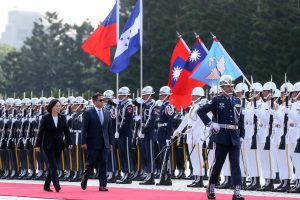Outgoing Honduran President Juan Orlando Hernandez started a three-day surprise visit to Taiwan on Friday as Taipei worries that the next president of the Central American nation may break off relations and switch to diplomatic ties with Beijing.
Hernandez and his wife will meet President Tsai Ing-wen on Saturday as part of a celebration of 80 years of diplomatic relations between Taiwan and Honduras. He will also visit the Central American Bank for Economic Integration office in Taipei, a Honduran development bank.
Hernandez has visited Taiwan three times before, Taiwan’s Central News Agency reported, twice as president (in 2015 and 2016) and once a speaker of the Honduran parliament (in 2010).
Xavier Chang, a spokesperson for Taiwan’s Presidential Office, said that under Hernandez’s administration, ties between Taiwan and Honduras have deepened: “The scope of cooperation has grown even wider and friendship has been upgraded.” Chang pointed out that three of Hernandez’s children are currently living in Taiwan, either to study or to work.
Hernandez’s trip comes just weeks ahead of the presidential election in Honduras, which is set for November 28. He is due to leave office in January.
Hernandez’s re-election in 2017 was accompanied by widespread allegations of electoral fraud and his government turned to the military police to violently quash protests after the polls. Given that history, Hernandez makes an uneasy ally with proudly democratic Taiwan, a point Brian Hioe made back in 2017. Taiwan has similarly set democratic values aside to maintain relations with Eswatini, Africa’s only absolute monarchy.
Since the 2017 election crisis, Hernandez has only become more isolated abroad. He is facing allegations of ties to drug traffickers from U.S. federal prosecutors in New York. His brother had been arrested in Miami in 2018 by U.S. authorities on suspicion of drug trafficking.
Politically, the benefits of the trip are unclear. Hernandez will not be able to run for office again, said Antonio C. Hsiang, a professor at La Academia Nacional de Estudios Y Estrategicos. Instead, Hernandez is likely in Taiwan to seek support, financial or otherwise, he said.
According to CNA, Hernandez told media he was looking to secure a promise for Taiwanese financing of a bridge linked to the construction of the Amapala mega-port on Tiger Island, located in the Gulf of Fenseca on Honduras’ southern, Pacific coast.
Taiwan, meanwhile, is concerned about the election as one of the leading candidates has openly said she is in favor of establishing ties with China. To do that, Honduras would have to sever ties with Taipei in deference to Beijing’s “one China principle.” Beijing claims Taiwan as part of its territory, but the island has been self-governing since the Republic of China government decamped there from the mainland in 1949.
Xiomara Castro, the presidential candidate for the opposition Liberty and Refoundation Party, said in a June 28 post on her Facebook page: “I believe in multipolarity and because of that I propose opening international relations with continental China, which would help the country incorporate into the market with the market of the world’s greatest growth.”
When asked about Castro’s pledge in September, a Chinese Foreign Ministry spokesperson said, “Following the one-China principle is the overriding trend with popular support. China welcomes all moves that endorse and support the one-China principle.”
As of this writing, China’s Foreign Ministry had not commented on Hernandez’s trip to Taiwan.
China has been on a campaign to poach Taiwan’s allies, of which only 15 remain. Since Taiwan’s current President Tsai Ing-wen first took office in May 2016, and Beijing unilaterally decided to overturn a “diplomatic truce” in place with the previous Ma Ying-jeou administration, seven countries have switched their recognition from Taipei to Beijing. Two of those – Panama and El Salvador – were Honduras’ fellow Central American states. Latin America and the Caribbean as a region is Taiwan’s single-largest source of diplomatic partners at the moment, accounting for nine of its 15 allies.
After the most recent switch in diplomatic recognition, on the part of Kiribati, Taiwan’s Ministry of Foreign Affairs blasted China for a “continued campaign to push Taiwan’s allies to sever diplomatic relations is to suppress and reduce Taiwan’s international presence, thereby forcing the Taiwanese people to accept the ‘one country, two systems’ framework and recognize China as its suzerain in the international community, and thus to ultimately destroy Taiwan’s sovereignty.”
“The R.O.C. government will stand firm in upholding Taiwan’s sovereignty, making no concessions with regard to its sovereignty in the face of China’s diplomatic assaults,” the ministry said, referring to the formal name of Taiwan’s government, the Republic of China.
China has been using diplomatic and economic incentives to persuade countries to switch their diplomatic recognition, often promising large investment or trade deals to countries willing to make the switch. Taiwan, for its part, also had a history of engaging in “checkbook diplomacy” to win or keep diplomatic allies, before disavowing that practice under Tsai Ing-wen.
In September, a spokesperson for Taiwan’s Foreign Ministry warned Honduras not to be lured in by “flashy and false” promises from China. Taiwan will “take concrete actions to demonstrate our country’s assistance to the development of Honduras’ economic and social affairs, and strive for the support of Honduras’ ruling and opposition parties for Taiwan,” the spokesperson said.
Associated Press writer Marlon Gonzalez in Tegucigalpa, Honduras contributed to this report.

































